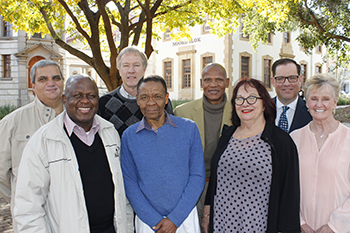
Dr Whitty Green (DHET), Phillip Dikgomo (NDBE), Ernst Stals (Free State Department of Education), Isaac Mogotsi (Nothern Cape Department of Education), Tsatsi Montso (Free State Department of Education), Prof Daniella Coetzee (Principal: South Campus), Steven Bailey (Academic Partnerships), and Prof Judy Zimny (Academic Partnerships)
Photo: Eugene Seegers |
The South Campus of the University of the Free State (UFS) has become the first in South Africa to introduce a completely online platform for educators to obtain the Advanced Certificate in Teaching (ACT) in either Foundation, Intermediate, or Senior Phase.
Beginning with the first start date of 4 July 2016, this platform will be offered in nine or ten 8-week sessions. It will provide educators the opportunity to complete these certificates in 18-20 months compared to the 24 months usually required by part-time university students. Academic and technological support will also be provided.
Unique platform
Prof Daniella Coetzee, Principal of South Campus, said that she is thrilled, “as this opportunity for educators to earn a qualification 100% online - is a first for both the UFS and South Africa.” This opportunity represents tremendous strides in providing options for South African educators.
According to Prof Jonathan Jansen, Vice-Chancellor and Rector of the UFS, human connectivity is a key component of education: “We should never reduce education to a stranger at a distance without any human interaction. That is also why the UFS has been consistent in promoting not only its Academic Project, but the Human Project as well.” He said that it would not be possible to extend second-chance opportunities to students without partnerships with government, non-profit organisations, local and international academic partners, and other external stakeholders.
Specific challenges addressed
In her presentation, Prof Judy Zimny, who is affiliated with Academic Partnerships (a company that has supported more than 40 universities in providing high-quality online programmes for educators) aligned a number of the challenges described by South African leaders in supporting educators with opportunities now available through online education as a result of recent strides in learning technologies.
Various members of the national education sector were also present at the workshop to give their input: Isaac Mogotsi (Northern Cape Department of Education), Phillip Dikgomo (National Department of Basic Education - NDBE), Dr Whitty Green (Department of Higher Education and Training - DHET), Tsatsi Montso (Free State Department of Education), and Ernst Stals (Free State Department of Education).
For educators interested in pursuing an Advanced Teaching Certificate (ACT), the website will soon be populated with all admission and enrolment information for programmes starting on 4 July 2016, 29 August 2016, and 24 October 2016.